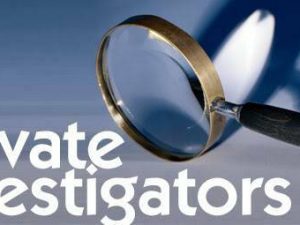
When I retired from police work after 34 years of service, I became a Private Investigator in my home state of Oregon. I had the good fortune of being able to “retire” at a relatively young age and I had honed my investigative skills on all types of criminal and administrative investigations over the years, so continuing to investigate things seemed like a natural transition. When I recently mentioned to one of my neighbors that I was now working as a private investigator, he asked two very simple questions, one-right-after-the-other: “What do you do? Who hires a private investigator?” Good questions.
Often the work PI’s do is shrouded in mystery. After all, the work a private investigator does is “Private.” That is, the results of these investigations are disclosed to the PI’s client – and no one else, unless the client consents to involving the police or letting others know the results of an investigation. Television shows have often depicted private investigators as disheveled gadflies who work in a cesspit of secrecy. Today’s real-life PI’s are far removed from the television image. A good investigator looks like a “regular” person and quietly goes about conducting business is an unassuming manner. By “blending in” PI’s are able to befriend people and gather valuable information and evidence that is otherwise unattainable.
What do private investigators really do?
Private investigators are hired to find out facts and analyze legal, financial, and personal information. Investigative needs for businesses, attorneys, and individuals range greatly from verifying people’s backgrounds for employers, conducting workplace investigations, finding missing persons, marital infidelity investigations, to helping attorneys prepare criminal defenses, uncovering evidence in civil cases, and locating witnesses. Quite simply, the job of a private investigator is to “find things out.”
Who hires private investigators?
Many private investigators work for insurance companies and are hired to expose fraudulent disability insurance claims. This often involves the investigator conducting sub rosa video surveillance. The investigator will watch the claimant conduct day-to-day activities and covertly video tape those activities that suggest the claimant is not disabled, or at least not as disabled as they claim. Sometimes the investigator will use other investigative tactics in conjunction with video surveillance like pre-texting, targeted neighborhood canvassing, or wireless remote controlled cameras or GPS tracking devices to track the claimant.
I have no qualms working surveillance cases for insurance companies. Fraud is fraud. If the person claiming a disability is truly disabled, the evidence will support the claim. But, most of my clients are not insurance companies. They are traditional businesses, large and small, who suspected their employees or business partners are stealing from them. This is not surprising as every year companies in the United States lose up to 40 BILLION to employee theft. A recent report by the US Chamber of Commerce revealed that one out of four employees’ steals something of value from their employer in any given year.
Sooner or later almost every employer will face the need to investigate something related to the business. Workplace investigations run the gamut and include, but are not limited to, employees who are stealing property from a worksite, theft of time and abuse of sick leave, workplace violence and threats, discrimination, disparate treatment, and harassment complaints.
Every workplace investigation is different. Some are complex and some are rather straightforward. Regardless of the scope and complexity, multiple investigative methods and techniques are required in most cases. To illustrate the type of work PI’s are often involved in, here are two examples:
Investigation Uncovers Workplace Theft Scheme
• A home builder experienced repeated thefts from several worksites costing over $40,000 in losses. There seemed to be no pattern to this thievery. Sometimes pallets of lumber would just disappear in the dark of night and on other occasions newly installed appliances were stolen from homes under construction. The local police said they would “keep an eye out” but did not have the time or desire to do anything more.
The builder hired a private investigator who conducted targeted surveillance. When thieves arrived at 3 o’clock in the morning and hauled a truck load of plywood from the construction site, the investigator tailed the truck across town. The investigator watched the thieves unload the wood into a garage. Follow-up investigation by the PI revealed the thieves were working in cahoots with a subcontractor the builder was using. The investigator built a comprehensive criminal case complete with photographic evidence, and then notified local police. The police used the evidence uncovered by the PI and served search warrants and recovered a trove of stolen building materials and made several arrests. As a result, a theft ring that had been operating unimpeded for more than a year was put out of business.
Investigation Clears Business Owner from Suspicion of Illegal Activities.
• The owner of a Bar & Grill was receiving extreme scrutiny from liquor control authorities. The establishment was accused of over serving patrons and was being blamed for drug use and public intoxication in the neighborhood. The business was on the verge of having their liquor license revoked which would have put the establishment out of business. Rather than just wait for liquor control authorities to shut the business down, the owner decided to take proactive action. If servers were over serving drinks, the owner wanted to know about it so corrective personnel action could be taken. If patrons of the bar were really responsible for causing problems in the neighborhood, the owner needed to know so effective security measures could be implemented.
The owner hired an investigator who started by conducting covert surveillance inside and outside the establishment. The investigator also went undercover and was able to befriend some employees and patrons. The investigation revealed that one employee was over serving some patrons. The bar owner immediately took corrective personnel action.
The investigation also showed that the drug use and public intoxication was emanating from an “upscale” nightclub a block away and not from the Bar & Grill. The results of the investigation were turned over to liquor control authorities. When faced with the persuasive evidence obtained and complied by the PI, liquor control authorities stopped focusing on the Bar & Grill and focused their enforcement efforts on the real source of the problems.
These are just two examples of how businesses use private investigators to improve their business practices and enhance profitability.
Along with conducting investigations for businesses, I do some investigative work for local attorneys and I even do a few of the stereotypical “infidelity” investigations, but that part of the PI business has sharply declined over the years. Oregon, like many states, is a “no-fault” divorce state and you no longer need to prove infidelity. And, technology and social media has given many people other ways to “check-up” on their spouses and partners. For more information about the investigative services I provide as an Oregon PI, please see link in my Bio below.
In future articles I will discuss the things you should know before you hire a private investigator. There are many honorable and skilled private investigators across the country that give good value for your dollar. But, to get the most cost effective service and to have the best chance of getting the results you desire, you have to know how to compare investigative services and how to select the best investigator for your particular needs.




